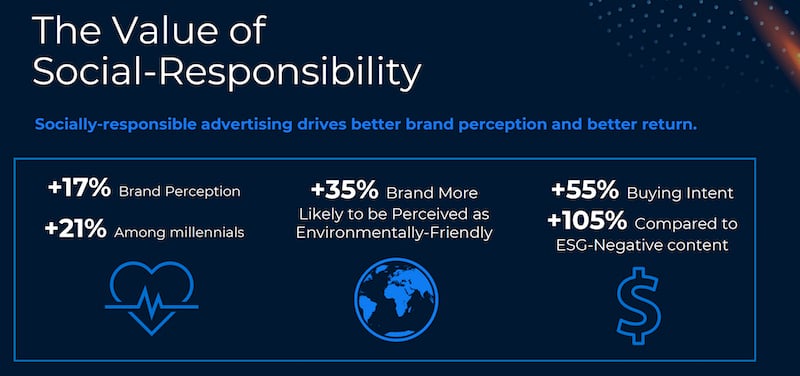Numbers Don't Lie: New Study Confirms Doing Good is Good for Business
Posted by Neal Thurman • Dec 13, 2021 5:00:00 AM
It is in my nature to want to believe that something that sounds intuitively valuable like aligning brand values with the content where that brand is advertised would improve consumer perception of that brand. It just sounds right, but that intuition has been wrong enough times that proving the case became the main topic of conversation when a colleague introduced Mr. Levi and me and suggested we chat about what Adverif.ai is up to.
Consumer opinion and intent are notoriously difficult things to track and measure. What people say when confronted with an explicit situation such as being asked specifically about the relationship between content and an adjacent advertisement and how that adjacency affects their perception of the brand can be different from them passively experiencing the content/advertiser pairing and not being asked to think about it explicitly. That said, asking consumers about their opinions on this front was a good place to start to figure out if better alignment of content and brand values is a worthy goal.

The Adverif.ai and Nielsen Innovate teams suggested we use sustainability messaging as a test bed for the hypothesis and went about designing a study to test consumer perceptions of a brand based on placement of its ads next to positive, neutral, and negative sustainability content. The results of the study came out strongly in favor of alignment between brand values and adjacent content improving brand perception and consumer intent. Ads placed next to pro-sustainability content:
- Led to 17 percent more consumers having a positive perception of the brand when compared to neutral content and 36 percent more consumers having a positive perception when compared to negative content (e.g., climate change denial)
- Drove consumer perception as the brand being pro-sustainability at higher levels than neutral content (+35 percent) and negative content (+97 percent)
- More than doubled the percentage of consumers reporting a high willingness to buy from that brand when compared with content containing negative sustainability sentiments like climate change denial
These results line up with a consumer study that BSI and TAG partnered on late last year and even more closely with a study released earlier this week by Dentsu and Microsoft. All of these pieces of evidence are pointing to consumers paying increasing attention to how and where marketers choose to advertise and the broader societal implications of those choices for how they perceive the brand.
The buy side is taking notice as the industry learns more about these linkages. “The Adverif.ai research underscores the importance of aligning brand and consumer values – particularly among younger generations who are increasingly voting with their wallets when it comes to matters of ESG [environmental, social and governance]. It’s promising to see how impactful contextual alignment can be in telegraphing a brand’s ESG positioning through media,” said Martin Bryan, Head of Sustainability at UM.
It is worth reiterating that consumer self-reporting isn’t a perfect tool for measuring real-world behavior, but the outcome of this study and the others like it represent steps in the direction of indicating to marketers the value of explicitly linking their buying behavior to their brand values. The team at Adverif.ai intend to build on this research in 2022 and we are excited to get the results and report back when that happens.
Topics: Brand Safety, Ad Adjacency, Research, Brand Suitability, buy side, Adverif.ai
Want To Stay Ahead In Brand Safety?
Sign up for the BSI Newsletter to get our latest blogs and insights delivered straight to your inbox once a month—so you never miss an update. And if you’re ready to deepen your expertise, check out our education programs and certifications to lead with confidence in today’s evolving digital landscape.

